|
BACKGROUND
DEFINITION OF TERMS (For Serious Students)
COVENANT
LAW
LAW
I. In the Old Testament
II. In the New Testament
GRACE
GRACE, MEANS OF
KINGDOM OF GOD
KINGDOM OF GOD, KINGDOM OF HEAVEN
I. In John the Baptist
II. In the teaching of Jesus
III. Kingdom and church
IV. In the rest of the New Testament
V. In theological thought
The
full background to this teaching is available online at this link
<b>DEFINITION OF TERMS</b> (For Serious Students)
|
Online links to scriptures (New International Version [NIV] unless otherwise stated) are shown in blue
| APOLOGIES..... |
|
.....for missing last week's teaching due to an unexpected visitor with 'not so friendly' intentions! We are both recovering well. Thank you Lord.
|
| SOCIETIES OF THE KINGDOM AGES (2nd of 2) |
|
___________THE THREE KINGDOM AGES__________
THEME______PATRIARCHS__PROPHETS___PEOPLE___
_______________Creation_____c.1500BC______c.5BC___
_______________c.1800BC_____c.432BC___Jesus Return
SOCIETY_______Nomadic_____Agrarian___Developmental
It hugely helps our understanding of each kingdom age to be aware of the basis upon which society operated. For God doesn't work in isolation. He operates within the structure of society that exists at the time. For example, it would have been impossible for the patriarchs to take God's word to Europe. They were unaware of its existence. Their world was centred round finding food for their animals. It wasn't until the Romans built a network of roads throughout their empire that the spread of God's word internationally, became logistically feasible. Hence, the time was then right for Jesus to come and give the Great Commission, to take the Word to a needy world.
|
| 1. NOMADIC |
|
See last issue.
|
| 2. AGRARIAN SOCIETY |
|
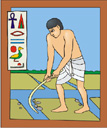 By the time the Jews left Egypt they had developed the social, organisational and farming skills necessary to become an independent nation. By the time the Jews left Egypt they had developed the social, organisational and farming skills necessary to become an independent nation.
So the scene was now set for God to reveal more of Himself to His people, to become the God of a nation. He communicated His requirements for worship, personal and societal behaviour to Moses on Mount Sinai. According to Jewish tradition there are 613 written commandments in the Torah, although no two lists are the same. The Ten Commandments today though, are accepted as being the most important. Of course, these are the ones written by God's hand, even though it had to be done twice! The rest were written down by Moses or Joshua, or possibly dictated to scribes to do so.
Exodus 21:1
|
|
|
 Jewish law, then and now also developed a strong oral tradition. But there is dispute over whether these edicts are of God or man. Jewish law, then and now also developed a strong oral tradition. But there is dispute over whether these edicts are of God or man.
The Law naturally reflected aspects of God's character. This was most dramatically revealed in His instructions for worship. This revelation fell into two principle areas.
Firstly, the Tabernacle of Moses. The Tabernacle was God's first church. A church wasn't necessary in Abraham and the other Patriarchs' days, for God revealed himself only to a small family group. Their tents were their church! Now however, His chosen people were a nation, and He needed to provide a focus for their worship.
Exodus 19:5-6
|
|
|
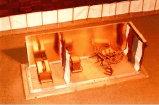 Interestingly, He didn't just pluck the design of the Tabernacle from some heavenly vault, where it had been waiting for this day. Rather, the design was somewhat similar to those used by the surrounding people. But through this incredible structure God was able to reveal not only His character but also proscribe the form of His Church for all time. Truly amazing! Not only was it a place of worship for the people, but the very presence of God dwelled there too. Its layout was summarised in the New Testament book of Hebrews. Interestingly, He didn't just pluck the design of the Tabernacle from some heavenly vault, where it had been waiting for this day. Rather, the design was somewhat similar to those used by the surrounding people. But through this incredible structure God was able to reveal not only His character but also proscribe the form of His Church for all time. Truly amazing! Not only was it a place of worship for the people, but the very presence of God dwelled there too. Its layout was summarised in the New Testament book of Hebrews.
Hebrews 9:1-5
|
|
|
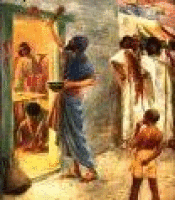 Secondly, the Feasts of the Lord. Through the pattern of the celebrations of the Religious Year, God further revealed His nature to His people. Through the feasts too, we can see the pattern and process of God's plan of redemption for His people, through the ages to come. The Feasts were, in our parlance, Passover, Pentecost and Tabernacles. Secondly, the Feasts of the Lord. Through the pattern of the celebrations of the Religious Year, God further revealed His nature to His people. Through the feasts too, we can see the pattern and process of God's plan of redemption for His people, through the ages to come. The Feasts were, in our parlance, Passover, Pentecost and Tabernacles.
Exodus 23:14
The understanding of God's nature and plan was further enhanced through His ongoing communication with His chosen nation of Israel. Through the Judges and Kings, Prophets and Priests, over a period of 1000 years until the end of the Old Testament, some 400 years before Christ.
After the people served their sentence for disobedience, 40 years in the desert, they progressively came into their promised inheritance, the state of Israel. The means to conquer and run their country was made possible by the written language, plus organisational and agricultural skills they had learned from the Egyptians during their time there.
When the people were obedient God was with them. Sometimes He acted supernaturally, but most of the time the Jews, as do we today, had to inherit the kingdom step by step, through hard work and sacrifice. Wars were fought, cities were built and fortified, administrations set up. Society had changed from being a wandering nomadic family group to a highly organised, settled, agrarian one. One to which God was able, in practical ways, to reveal more of His nature and character.
Unfortunately, through disobedience, the Promised Land was lost, piece by piece. By the end of the Old Testament, even though some had returned to the land from captivity, the Jews lived in subjection to the newer super powers that had risen up and conquered their lands. Only the dream remained.
|
| THE SECOND GAP |
|
 THE SECOND GAP of 400 years, separating the ministry of Nehemiah from that of Christ, was one of ferment and change. After relatively brief Babylonian and Persian periods of dominance, the Middle Eastern cultural tradition was crushed and replaced by the internationalist one of the new European invaders, the Greeks, then the Romans. THE SECOND GAP of 400 years, separating the ministry of Nehemiah from that of Christ, was one of ferment and change. After relatively brief Babylonian and Persian periods of dominance, the Middle Eastern cultural tradition was crushed and replaced by the internationalist one of the new European invaders, the Greeks, then the Romans.
Without doubt, of all the ancient empires, Greek culture has had the greatest impact upon the modern world. They were the first to make gods in their own image. By 'humanizing' their gods, it logically led to the next step of secular humanism, the belief effectively, that man is god. Roman culture was predominantly a continuation of the Greek, with a few differences reflecting the nature and background of the people.
The Greeks placed a huge emphasis on education and sport. Our education structures today are still based on Greek principles and of course, we have reintroduced the Olympic Games. Such Greek ideals as democracy, human rights, capitalism, classical art and architecture, absence of morality and tolerance for abnormal behavior, continue to live on in our society.
Alexander the Great dreamed of a world united by the Greek language and culture, one that he and his successors implemented through a process known as Hellenization.
Apart from the aristocracy, most of the Jews retained their dreams and religion, so this period became one of great but futile heroics as their rebellions were brutally thwarted by the all-powerful European invaders.
However the people's outlook inevitably widened as they came into contact with the wider world. It was into this milieu of change, both physical and intellectual, that Jesus was born.
|
| 3. DEVELOPMENTAL SOCIETY |
|
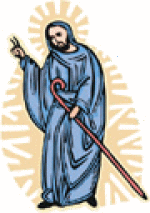 God organized the times prior to the introduction of His Son Jesus into the world. Humanists, in line with Greek thought, take the opposing view. The one that Jesus was an intelligent, spiritual man who simply responded to the ferment of new ideas to proclaim an updated set of religious principles based as a response to the 'new world' in which he lived. An impasse! The classic chicken and egg problem! God organized the times prior to the introduction of His Son Jesus into the world. Humanists, in line with Greek thought, take the opposing view. The one that Jesus was an intelligent, spiritual man who simply responded to the ferment of new ideas to proclaim an updated set of religious principles based as a response to the 'new world' in which he lived. An impasse! The classic chicken and egg problem!
But I trust you will see, just as the hand of God was present in placing the Jews into Egypt, so it is present here in preparing a society and world to be ready for the radical, worldview of Jesus. As we saw in the case of the Tabernacle, God uses the history and culture of all people for His own purposes.
So at the time of Jesus, we have a society slowly changing its focus. There was the contrast of the societal conservatism of the Pharisees, who desired to retain the societal status quo while modifying the oral religious tradition to suit the times. Too, the societal liberalism of the Sadducees who only accepted the written law of the Torah.
It became a developmental society! Development which has continued unabated at an ever increasing pace, (with the notable exception of the Dark Ages) for the 2,500 years or so since the rise of the Greek Empire. Today, we live in a society that has evolved progressively through the experiences of the Agricultural, Industrial and now, Knowledge Revolutions.
Jesus came then, as the final, living revelation of a living God.
Colossians 1:15
|
|
|
 Jesus is a further revelation of the God revealed to the Patriarchs and the Jews, to further enlighten us about the character and nature of the Father. Jesus is a further revelation of the God revealed to the Patriarchs and the Jews, to further enlighten us about the character and nature of the Father.
2 Peter 1:2
|
|
|
 As part of our walk with Jesus we are instructed to deepen our knowledge of Him. As part of our walk with Jesus we are instructed to deepen our knowledge of Him.
2 Peter 1:5-9
|
|
|
We have literally had made available to us the knowledge of the kingdom.
Matthew 13:11
|
|
|
 And warned of the consequences of ignoring the knowledge given. And warned of the consequences of ignoring the knowledge given.
Matthew 13:12
|
|
|
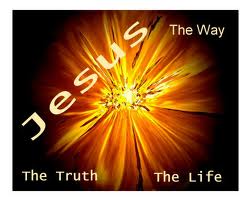 Instructing us that there is but the one way to find God. Instructing us that there is but the one way to find God.
John 14:6-7
|
|
|
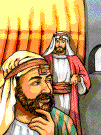 Jesus accused the Pharisees of preventing people from gaining knowledge! Jesus accused the Pharisees of preventing people from gaining knowledge!
Luke 11:52
|
|
|
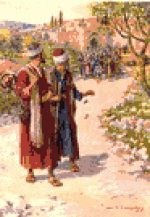 The former Pharisee Paul explained to the Jews that, even though they were zealous, they were missing out because they did not have the knowledge of God revealed through Jesus. They were not prepared to accept the new revelation of the kingdom. The former Pharisee Paul explained to the Jews that, even though they were zealous, they were missing out because they did not have the knowledge of God revealed through Jesus. They were not prepared to accept the new revelation of the kingdom.
Romans 10:1-4
|
|
|
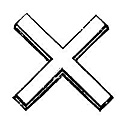 Of course, knowledge is not an end in itself but must be applied, to be useful. We can be very knowledgeable about God without truly knowing Him and living for Him. Of course, knowledge is not an end in itself but must be applied, to be useful. We can be very knowledgeable about God without truly knowing Him and living for Him.
1 Corinthians 8:1
|
|
|
But if we have this knowledge and ignore it, the consequences are dire!
Hebrews 10:26-7
|
|
|
 We are both blessed and challenged to be living in these days of the third and final revelation of God through Jesus. Blessed to be able to know Him better than those of millennia past. And challenged, to avoid the pitfalls of a world where knowledge is considered a replacement for God. Are we ready to live up to the challenge? We are both blessed and challenged to be living in these days of the third and final revelation of God through Jesus. Blessed to be able to know Him better than those of millennia past. And challenged, to avoid the pitfalls of a world where knowledge is considered a replacement for God. Are we ready to live up to the challenge?
|
| <i>NEXT WEEK</i> A REVELATION OF....... 3 KINGDOM AGES
THE KINGDOM'S REACH |
|
 Next week we are going to see how God's group of chosen people expanded through the 3 ages from family to nation, to the whole world today - if only we will believe. Next week we are going to see how God's group of chosen people expanded through the 3 ages from family to nation, to the whole world today - if only we will believe.
|
| A NOTE FROM DAVID |
|
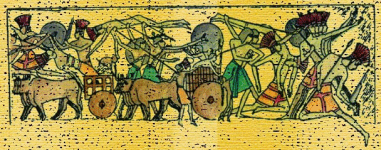 We are so blessed today to have the revelation of God that we do have. We are so blessed today to have the revelation of God that we do have.
Yet, unless we absorb it into the very core of our being, it really is redundant.
For God, in essence, is all about relationship. Relationship with the Father, with Jesus, through the Holy Spirit.
All the knowledge in the world is of no heavenly use unless it results in us becoming more like Jesus!
ANCIENT PHILISTINES & OX CARTS
The ox carts pictured would be similar to that used by the Philistines to transport the Ark of the Covenant back to Israel.
Source: http://www.bible-history.com
|
So until next week.......
MAY GOD BLESS YOU AND YOU BLESS GOD!
His servant and yours

Learn more about us at...
www.wwj.org.nz/about.php
|
A DAVID'S DOODLING
485. Laziness begets foolishness, knowledge wisdom, but the truth, godliness.
David Tait
|
Check
out the WWJ website for….
More David's Doodlings: www.wwj.org.nz/dd.php
Eagles Fly High! (Pastors, Teachers and Students): http://www.wwj.org.nz/eaglepts.php
God Facts (A mine of information): http://www.wwj.org.nz/gfacts.php
Facts for Fun: http://www.wwj.org.nz/facts.php
Marriage and Family Facts: http://www.wwj.org.nz/maffacts.php
|

 By the time the Jews left Egypt they had developed the social, organisational and farming skills necessary to become an independent nation.
By the time the Jews left Egypt they had developed the social, organisational and farming skills necessary to become an independent nation.  Jewish law, then and now also developed a strong oral tradition. But there is dispute over whether these edicts are of God or man.
Jewish law, then and now also developed a strong oral tradition. But there is dispute over whether these edicts are of God or man. Interestingly, He didn't just pluck the design of the Tabernacle from some heavenly vault, where it had been waiting for this day. Rather, the design was somewhat similar to those used by the surrounding people. But through this incredible structure God was able to reveal not only His character but also proscribe the form of His Church for all time. Truly amazing! Not only was it a place of worship for the people, but the very presence of God dwelled there too. Its layout was summarised in the New Testament book of Hebrews.
Interestingly, He didn't just pluck the design of the Tabernacle from some heavenly vault, where it had been waiting for this day. Rather, the design was somewhat similar to those used by the surrounding people. But through this incredible structure God was able to reveal not only His character but also proscribe the form of His Church for all time. Truly amazing! Not only was it a place of worship for the people, but the very presence of God dwelled there too. Its layout was summarised in the New Testament book of Hebrews.  Secondly, the Feasts of the Lord. Through the pattern of the celebrations of the Religious Year, God further revealed His nature to His people. Through the feasts too, we can see the pattern and process of God's plan of redemption for His people, through the ages to come. The Feasts were, in our parlance, Passover, Pentecost and Tabernacles.
Secondly, the Feasts of the Lord. Through the pattern of the celebrations of the Religious Year, God further revealed His nature to His people. Through the feasts too, we can see the pattern and process of God's plan of redemption for His people, through the ages to come. The Feasts were, in our parlance, Passover, Pentecost and Tabernacles.  THE SECOND GAP of 400 years, separating the ministry of Nehemiah from that of Christ, was one of ferment and change. After relatively brief Babylonian and Persian periods of dominance, the Middle Eastern cultural tradition was crushed and replaced by the internationalist one of the new European invaders, the Greeks, then the Romans.
THE SECOND GAP of 400 years, separating the ministry of Nehemiah from that of Christ, was one of ferment and change. After relatively brief Babylonian and Persian periods of dominance, the Middle Eastern cultural tradition was crushed and replaced by the internationalist one of the new European invaders, the Greeks, then the Romans.  God organized the times prior to the introduction of His Son Jesus into the world. Humanists, in line with Greek thought, take the opposing view. The one that Jesus was an intelligent, spiritual man who simply responded to the ferment of new ideas to proclaim an updated set of religious principles based as a response to the 'new world' in which he lived. An impasse! The classic chicken and egg problem!
God organized the times prior to the introduction of His Son Jesus into the world. Humanists, in line with Greek thought, take the opposing view. The one that Jesus was an intelligent, spiritual man who simply responded to the ferment of new ideas to proclaim an updated set of religious principles based as a response to the 'new world' in which he lived. An impasse! The classic chicken and egg problem! Jesus is a further revelation of the God revealed to the Patriarchs and the Jews, to further enlighten us about the character and nature of the Father.
Jesus is a further revelation of the God revealed to the Patriarchs and the Jews, to further enlighten us about the character and nature of the Father.  As part of our walk with Jesus we are instructed to deepen our knowledge of Him.
As part of our walk with Jesus we are instructed to deepen our knowledge of Him.  And warned of the consequences of ignoring the knowledge given.
And warned of the consequences of ignoring the knowledge given.  Instructing us that there is but the one way to find God.
Instructing us that there is but the one way to find God.  Jesus accused the Pharisees of preventing people from gaining knowledge!
Jesus accused the Pharisees of preventing people from gaining knowledge!  The former Pharisee Paul explained to the Jews that, even though they were zealous, they were missing out because they did not have the knowledge of God revealed through Jesus. They were not prepared to accept the new revelation of the kingdom.
The former Pharisee Paul explained to the Jews that, even though they were zealous, they were missing out because they did not have the knowledge of God revealed through Jesus. They were not prepared to accept the new revelation of the kingdom.  Of course, knowledge is not an end in itself but must be applied, to be useful. We can be very knowledgeable about God without truly knowing Him and living for Him.
Of course, knowledge is not an end in itself but must be applied, to be useful. We can be very knowledgeable about God without truly knowing Him and living for Him.  We are both blessed and challenged to be living in these days of the third and final revelation of God through Jesus. Blessed to be able to know Him better than those of millennia past. And challenged, to avoid the pitfalls of a world where knowledge is considered a replacement for God. Are we ready to live up to the challenge?
We are both blessed and challenged to be living in these days of the third and final revelation of God through Jesus. Blessed to be able to know Him better than those of millennia past. And challenged, to avoid the pitfalls of a world where knowledge is considered a replacement for God. Are we ready to live up to the challenge?  Next week we are going to see how God's group of chosen people expanded through the 3 ages from family to nation, to the whole world today - if only we will believe.
Next week we are going to see how God's group of chosen people expanded through the 3 ages from family to nation, to the whole world today - if only we will believe.  We are so blessed today to have the revelation of God that we do have.
We are so blessed today to have the revelation of God that we do have.